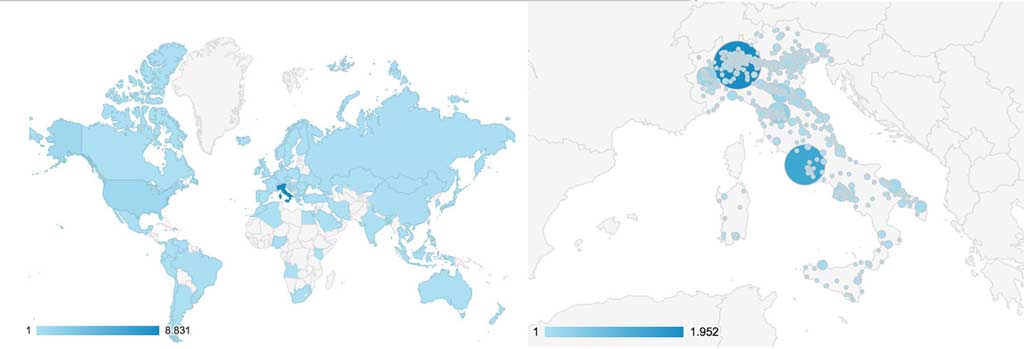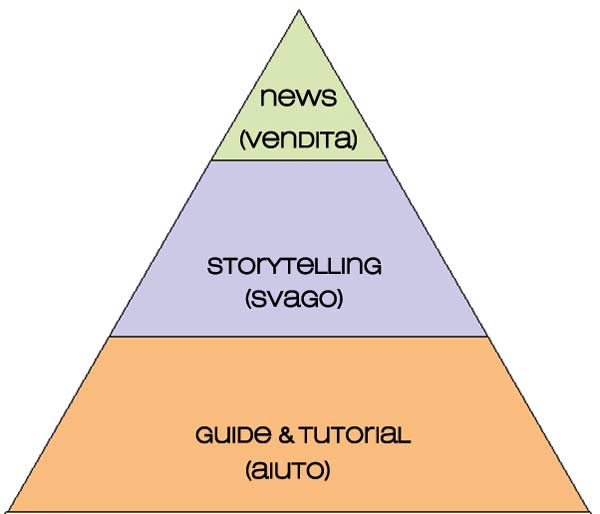In this guide you will discover techniques and strategies unknown to most of those who sell you the art of communicating wine. In practice you will learn 2 fundamental tricks to effectively improve the way you sell wine.
I will soon publish a very comprehensive guide on Wine Communication... this article is a small sampling referring to the chapter in my guide "How to create a successful corporate blog and sell without opening an e-commerce"... Would you like to enjoy it with me? 😉
In this guide I will reveal:
- Why invest in proprietary media (i.e. why to create a corporate blog or why a Facebook page is not enough)
-
How to choose the most profitable topics (i.e. how to identify your competitors, your audience and understand which topics to write about)
Before I start telling you all the secrets of proper wine communication, however, it is very important to make a premise:
It is absolutely useless to make any effort on the web if you do not constantly monitor and analyse the results you get.
Let me be clear: I am absolutely against all forms of procrastination! I see people suffering from the last stage of procrastination all the time who find sensational excuses not to get a grip on their lives. The best one I heard I think was 'Because I am a perfectionist, I am not prepared enough to start realising my dreams'. You will never achieve anything if you keep procrastinating, so read this guide and start grinding results now!
Whether you are a winemaker, blogger or administrator of a Facebook group or corporate Facebook page... you will never get real results until you monitor and analyse your work on a daily basis.

Geographical distribution of Perlage Suite's unique visitors in May 2015. Out of 11,011 total unique visitors, 8,831 are Italian and in particular almost 2,000 are from Milan.
For example, this website in May 2015 totalled 11,011 global unique visitors of which 8,831 were Italian and almost 2,000 Milanese. From this data it emerges that if I want to run an advertising campaign to sell one of my products, I will concentrate my target audience in Milan and the surrounding area where I already have an established following that gives me authority and I consequently have a better chance of closing the sale at a lower investment price. Another possibility would be to say: from this analysis it emerges that I do not have a following in Basilicata and I have very little following in Sardinia, I could do a campaign to make myself known in these regions... in short, the important thing is to analyse the statistical data aimed at the objective and align the advertising campaign with what has emerged.
In this regard, I recommend you read some good books, these can be found on Amazon at the lowest price I could find on the net:
- Web Analytics 2.0. Measuring online success in the web 2.0 era
- Google analytics. User guide
- Advanced Web Metrics with Google Analytics
- Advertising on Facebook. Only the numbers that count
- Facebook Marketing strategies and tactics for companies and professionals
But above all, I invite you to read what I consider to be a bit of a web marketing bible:
This is not just a practical guide to shortening the distance that exists between companies and customers or to capture the attention of your interlocutor and learn how to use your resources to sell. This is the book that will change the way you sell online forever. Alessio Beltrami is smart, but above all he has the same vision of how to sell online as I do.
[Tweet "Selling online does NOT necessarily mean opening an e-commerce. #webmarketing #blog"]
I like to think that you reading me now are paying my work with your most precious currency: your attention. You could be anywhere right now: having a drink, taking a walk or making love and you choose to be here, reading my great little contribution that I have written to help you improve your business.
Thank you!

TRICK 1: Why invest in proprietary media (i.e. why create a corporate blog)
[Tweet "Rule 1: if you want to sell, don't sell!"]
The professional blog is the most successful weapon a company has to sell itself without selling anything. Obviously I am talking about a corporate blog done well, with valuable content. I have often seen companies that confuse the corporate blog with news and publish self-congratulatory articles about what they are up to. I ask you a question: why do you do research on the internet? Or even easier, why do you use the internet? There are 2 answers and they are the same for everyone:
- entertainment
- solve a problem quickly (possibly for free)
I personally do not know of any other physiological reasons for using the web... but if you think there are others, I ask you the kindness to HELP ME by leaving me a comment 😉
And now that we have clarified the needs of the demand, let us analyse the supply: the successful corporate blog must be a source of entertainment and/or help for those who read it. Any other purpose will not produce the expected result... so... stop publishing news about your company and get it into your head that web users, unless you have such a strong brand in your industry, don't give a damn about what you do... and even less about where you are! Not convinced? Think about the most used social networking site in the world: Facebook. Why do you use it? There are always 2 answers and they are once again the same for everyone:
- self-celebrating emotions, opinions or situations (making you feel important or venting about a situation);
- contacts/information of companies you are interested in via their company page (i.e. solve a problem quickly for FREE).
And if you now tell me that you also look at your home page and see what your friends write... have you ever noticed that you always see the statuses of the same friends? Whether you have 10, 100 or 1000 friends you will always see the same ones! And who are these friends? Simple: they are the ones you interact with most on Facebook (tags, likes, events, family...) These 'closest' friends are the famous leading brands, i.e. the ones you are interested in a priori... and you consult what they write or visit their profile a priori (Facebook calculates them with an algorithm)! But for other friends (read small/medium-sized companies) this does not happen so it is up to them to value you (read Facebook interaction or blog guide) to enter the temple of close friends (read famous companies) and be displayed by default in your home (read being in the favourites bar of your PC).
Facebook recently implemented 'News Section Preferences' where you choose who you follow and who you don't (In practice, this translates into who you see in your home page). By default, Facebook first follows everyone you send a friend request to, then 'skims' based on the number and quality of your interactions over a given period of time.
So now you understand why people use the internet/social networks. But have you understood why the company blog is more important than the Facebook page?
In this regard, you have to get one thing into your head:
FACEBOOK IS NOT A NON-PROFIT ORGANISATION!
Facebook is a company and as such must earn money to support its costs and to have a sense of existence... or it would seriously become a non-profit organisation. How does Facebook earn money? The answers are always 2:
- Spontaneous user profiling database giving it a value $$$ on the stock exchange (each Facebook user is worth around 100$);
- Sale of advertising space.
FACEBOOK HAS NO INTEREST IN A FACEBOOK PAGE THAT DOES NOT BUY ADVERTISING SPACE EARNING MONEY USING FACEBOOK. This translates into low visibility: maybe you have 5000 likes on the page but your post is only seen by 70 people. You want more people to see it? PAY. But then don't complain if Facebook changes all its algorithms in a month's time to favour THOSE WHO PAY MORE THAN YOU and you have literally flushed your money down the toilet (unless you want to pay even more and be put on the back foot at the next policy change).

Resign yourself: Facebook is right. Facebook is a company with costs, employees, earnings, shareholders... And as such FACEBOOK LOOKS AFTER ITS INTERESTS AND NOT YOURS!
Let me be clear that I AM NOT DEMONISING FACEBOOK: I follow Facebook pages for my clients who pay me €€ every month. But I do it sensibly: NO spend money to get more likes, YES spend money to get clicks to your website. Then I agree that a lot of likes on a company's Facebook page increases the authority of that page... but likes are also bought: 1,000 for a few euros for illegal likes that will never produce any results. Do you really want to invest real money to build a solid and legal network of 'likes' for more authority? I give you a seemingly trivial piece of advice that is worth €1,000, and all I ask in return is that you share this article for free in your favourite social network:
To increase your company's authority and get more real and even more valuable likes, ask your Facebook friends and customers to invite their friends to like your Facebook page! You will get many more 'likes' and these will be more valuable through virtual word of mouth (a 'cold' advertisement is one thing, a friend's invitation is another. Why should they do this for you? Simple! You will give them a reward, you will pay for their action. For example, for every 'like' your friend/customer is able to generate they will receive in return 1% discount on your product/service up to a maximum of 50%. Translated: Guy invites 400 friends to like your Facebook page, 40 of Guy's friends like your page, Guy earns the 40% discount on your product/service. And according to you, I don't waste 10/15 minutes inviting all my Facebook friends in the face of the fact that if for example I normally come to you and spend €200 on wine just because of the invitations I made, I save/gain €80?
So at this point we need a corporate website or blog right? Still not convinced? Well then, always remember this:
YOUR CORPORATE BLOG FOLLOWS YOUR CONDITIONS. NO ONE WILL EVER CHANGE THE POLICIES TO SPECULATE ON THEM AND THE RESULT YOU GET IS ENTIRELY UP TO YOU. In the hope that you look after your own interests of course 😉
.
TRICK 2: How to choose the most profitable topics (i.e. how to identify your competitors, your audience and understand which topics to write about).
Let us definitively clarify one thing: I am a Web Designer, out of passion, I chose to specialise in wine communication (i.e., developing websites aimed at selling wine or wine-related services) and for this I further specialised in Winery Web Design or in web development for wine companies. Development also understood as growth, as improvement.
So the objectives of this blog are:
- increase my popularity in the world of wine marketing;
- find new customers to whom I can sell my services.
How do I achieve these goals?
- increase my popularity throughout the wine world;
- I help my potential 'agents'/customers (i.e. aspiring sommeliers and wine cellars) solve their problem in the certainty that they will remember me one day.
That said, my competitors are:
- wine bloggers (they are often also journalists and/or web designers);
- web agencies specialising in the wine sector.
"Chiara! I want names!!!"
As I always say, whoever is not in the first 2 pages of Google does not exist so... I cite the first 10 results out of 15,900,000 total results for the query (i.e. search key) "wine blog“:
- Wine to Wine by Franco Ziliani
- Wine - L'Espress Blogo by Fabio Rizzari e Ernesto Gentili
- Intravino by Fabio Cagnetti, Francesca Ciancio, Giovanni Corazzol, Jacopo Cossater, Andrea Gori, Emanuele Giannone, Cristiana Lauro, Mauro Mattei, Alessandro Morichetti, Alessio Pietrobattista, Leonardo Romanelli
- Lazy Wine by Lizzy
- Wine trails by Andrea Petrini
- DiVini - Corriere della Sera by Luciano Ferraro
- Other people's wine by Andrea Scanzi
- Aristide by Giampiero Nadali
- Wine Blog Roll by Francesco Saverio Russo
- Perlage Suite by Chiara Bassi
I have omitted irrelevant results and abandoned sites because they are not useful for the purpose of this discourse.
Now you might object to me that these sites do not actually sell wine cellar websites. You are partly right! But many wine and web enthusiasts have specialised in wine marketing (rightly so...) and are also successful bloggers 🙂 Similarly, 'traditional' web agencies are normally not as highly specialised in one area of production as Perlage Suite because this is obviously a risk. So I have only found 4 that do this job (but surely there are others...):
- Clear Web of Piacenza
- Winery of Ancona
- Serene Web of Brescia
- Drinking wine of Palermo
it is evident that there are very few competitors... and if we calculate that in Italy there are 265,000 wine cellars according to Federvini, we have over 50,000 potential customers each. Then it is true that all web agencies can do web development for a wine cellar or a blogger... but being specialised in a sector means you have a deep knowledge of it and the results obtainable from the same site are very different! After all... would you rather buy a computer from a company that only produces computers and whose core business is computers, or would you rather buy a computer from a company that produces computers but also televisions, blenders, digital scales, washing machines and refrigerators?
So what?
So I have established that the market EXISTS and HAS MANOEuvre SPACE. And what is your market? What are your main competitors?
Once you have analysed your market, you MUST STOP SELLING (AND START GAINING). How? By starting a corporate blog of course!
We are so bombarded with advertising every day that our brains have become accustomed to avoiding it a priori. We are so bombarded with lists of services on sale or on offer that our brains no longer even see them. By now, our hours on the web are, as already mentioned, aimed at leisure or seeking help to solve one of our problems while trying to avoid as much as possible those who want to sell us products and/or services. So how can you stand out from the crowd? Help users enjoy themselves and solve their problems thanks to the valuable content that you, an expert in your field, will write for them. Win their trust: they will be the first to talk about you and seek you out to buy your products! And then... THINK ABOUT THE SATISFACTION YOU WILL GET FROM HELPING SOMEONE! It really does me good, it fills my heart. And then I want to think that there is such a thing as karma... and that today I helped someone achieve a goal and tomorrow someone will help me 😉
Well, now that you have understood how to identify your competitors and your potential audience (but learn to always be specific when talking about your audience!), are you ready to figure out what to write in your blog?
Here it is crucial that you understand one thing: YOU MUST BE WRONG. OK, you have analysed who your competitors are and what they write... now what? Write about topics you are an expert/specialist on... some will get great results, others hardly anyone will get away with! So here again we come back to the importance of monitoring and analysing the statistical data of your website. From an early age we are taught that failure is wrong. False! Failing repeatedly is the only way to achieve extraordinary victories! What is really wrong is to be the victim of a total inability to change one's mind, prejudice or fear. What is wrong is always feeling better than others, putting ourselves on a pedestal and blaming others for our failures. What is wrong is to keep procrastinating suffering from severe forms of 'procrastination'. So don't wait for inspiration for the right topic... and write about as many 'wrong' topics as you have something to teach. Only then will you be able to identify the topics that give you the most exposure and concentrate on those. The rest is experience.
This article is dedicated to wine cellars, but is actually useful for any company.
If you really want to be successful with your blog, intersperse your articles according to a precise pattern. That is, give your publications a precise structure!  In summary, out of the 6 articles you can write, for example, 3 will be helpful (for example, I specialise in articles on wine communication and the exam to become a sommelier... also because these are the sectors in which I excel and which give me the most user traffic), 2 articles will be leisure articles where you will focus on the storytelling of your company (tell about the wine, the vines, your family history, your passion, what you like to do in your free time...) and 1 article will be a news item aimed at sales... where obviously you won't have to sell anything! For example, you will tell about an award you won with a label... a conference you are attending, an event you are organising... all these things should make the reader think how good and beautiful you are and how much they want to taste your wines! But always remember that subliminal advertising is the best: it creeps into your brain and never leaves you 😉
In summary, out of the 6 articles you can write, for example, 3 will be helpful (for example, I specialise in articles on wine communication and the exam to become a sommelier... also because these are the sectors in which I excel and which give me the most user traffic), 2 articles will be leisure articles where you will focus on the storytelling of your company (tell about the wine, the vines, your family history, your passion, what you like to do in your free time...) and 1 article will be a news item aimed at sales... where obviously you won't have to sell anything! For example, you will tell about an award you won with a label... a conference you are attending, an event you are organising... all these things should make the reader think how good and beautiful you are and how much they want to taste your wines! But always remember that subliminal advertising is the best: it creeps into your brain and never leaves you 😉
In summary, thanks to me you learnt that:
- Today, a corporate blog is the best sales tool;
- if you want to receive, you have to give - i.e. the importance of creating valuable content;
- Facebook is not a non-profit organisation;
- Analysing the statistical data of your website is crucial for targeting your articles and targeting your marketing campaigns;
- The editorial pyramid (which you can view by unlocking the content above with your email) is the key tool for keeping your readers' attention.
Or you already knew everything... but I was a further confirmation! 😉
Have you already started your own corporate blog? How do you find it? Tell me in a comment!
P.S. I salute you with an image where I was tagged on Facebook that cracked me up:
and I would like to take this opportunity to remind you that from 8 May 2015 it is compulsory to indicate the presence of cookies at the entrance to the website! Sites not complying with this regulation that are reported to the competent authority will incur fines of between €6,000 and €120,000! Personally, I have already adapted the websites of all my clients for free... if you haven't already done so, what are you waiting for to ask your trusted web agency to update your site?
.
Cheers 🍷
Chiara

